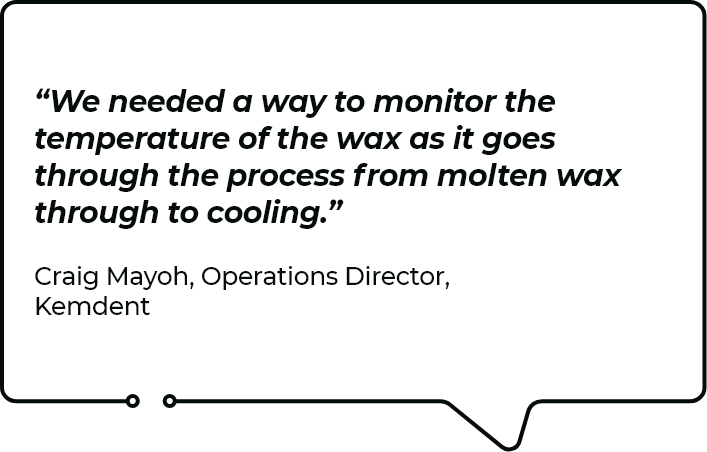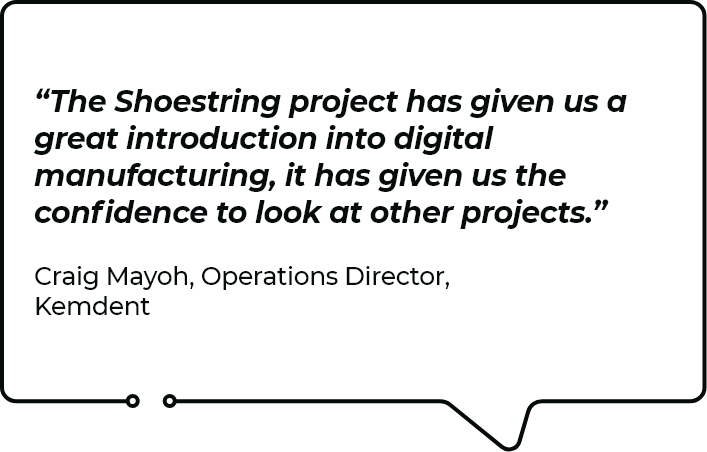Case study
Temperature monitoring at Kemdent
Bewildered by the myriad of options available, Kemdent was unable to find a way to start using digital technologies to drive resource efficiency in their wax forming process, until the team met Shoestring.

Kemdent is a small-sized company that manufactures dental products for the professional dental market worldwide. As a small traditional manufacturer, Kemdent faced challenges in starting their digitalisation journey due to the overwhelming options available.
The Operations Director, Craig Mayoh, explained: “We were finding it hard to digitalise our processes in house, mainly because we didn’t have the knowledge or expertise”. However, they discovered the Shoestring team at a virtual exhibition and using the Shoestring workshops found a solution to begin their digitalisation process.
The business challenge
The main product Kemdent produce is modelling wax which is used in the process to manufacture dentures. The team wanted to collect temperature data on their wax production line. The Operations Director aimed to improve profit margins and customer satisfaction, while the Production Line Supervisor wanted to analyse losses and identify areas for improvement to meet production targets.
The solution
The first step in the Shoestring process involved pinpointing the primary business challenge and finding an affordable digital solution. Kemdent selected a temperature monitoring system to address the need for monitoring wax temperature during the production process. This system would help ensure that the wax cooled at the right rate to prevent defects. Hence, a low-cost temperature sensing system was built and set up across one production line.
Gaining confidence with digitalisation
This video shows how the Kemdent team installed the low-cost temperature monitoring solution on their wax production lines and quickly saw productivity benefits.
The outcomes
The low-cost temperature monitoring solution allowed Kemdent to identify the optimum temperature for wax production. Once proven to work on one production line, the solution was rolled out across the shop floor, allowing the system to monitor multiple production lines simultaneously. This helped improve product quality and reduce waste. The real-time report displayed on the shop floor’s dashboard provided instant visibility of wax temperature to all operators.
By engaging staff in the deployment process, Kemdent successfully increased employee knowledge and confidence in digitalisation, while improving resource efficiency.
What are the next steps?
With a better understanding of how digitalisation can benefit their operations, Kemdent has gone on to develop a second Shoestring solution focused on Overall Equipment Effectiveness (OEE). By leveraging the Shoestring approach and implementing low-risk solutions, Kemdent has demonstrated the tangible benefits of digitalisation within their factory. This success has brought about a cultural change, shifting employees’ attitudes toward digitalisation, and enabling the company to move closer to Industry 4.0.
Case study summary: Kemdent
Solution setup:
- Solution: temperature monitoring of wax production process
- Deployed: initially on one production line, then rolled out across four wax production lines
- Technology used: one Raspberry Pi 4.0; three Raspberry Pi 0; infra-red sensors; open-source Grafana dashboard; (company also used a monitor displayed on shop floor); Shoestring temperature monitoring software using open-source python libraries such as Django and Paho MQTT
- Technology cost: under £250
- Time taken to deploy: Four months
Outcomes:
- Identified optimal temperature for wax production
- Have real-time view of wax status on production line to help improve quality
- Improves digital skills of staff
- Company has increased its confidence and improved its ability to digitalise
Next steps:
- Installing a second Shoestring solution, overall equipment effectiveness
Find out more about this solution
Temperature
monitoring




